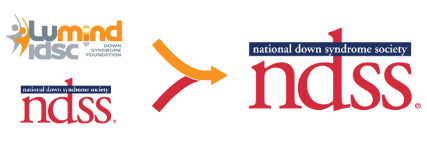Each year, the Down syndrome community and our supporters – family, friends, businesses, organizations and others – honor our loved ones on World Down Syndrome Day. This year, it feels appropriate on this special day to call attention to Alzheimer’s disease in the Down syndrome community – because this year, we see it as a message of hope.
People who have Down syndrome are living longer than they ever have before. Several decades ago, people with Down syndrome had a life expectancy of 25 years. Now, adults with Down syndrome can live into their 60s. That’s the good news. But that shift in longevity also presents a challenge.
For people with Down syndrome, the risk of developing Alzheimer’s disease increases with advancing age. By the age of 65, 95 percent of people with Down syndrome will develop Alzheimer’s Disease, compared to a 12 percent chance for people who are 65 and do not have Down syndrome.
There’s no other group of people more at risk for Alzheimer’s than people with Down syndrome. This risk necessitates urgent and collective attention.
As the CEO of LuMind IDSC, and as the parent of a nine-year-old son with Down syndrome, this issue is at the forefront of my work.
At LuMind IDSC, our goal is to accelerate Down syndrome research to increase the availability of therapeutic, diagnostic, and medical care options for people with Down syndrome, and to empower their families through education, connections, and support. One of the keys of how we serve the Down syndrome community is by increasing the opportunities available to enroll in Alzheimer’s clinical trials and by supporting and encouraging families to participate in those trials.
In the last 18 months, the wider Alzheimer’s community has had more reason for hope as two new life-improving Alzheimer’s treatments (Aduhelm amd Leqembi) have been approved by the U.S. Food and Drug Administration, and a third one (donanemab) could potentially be approved within a year. While these new treatments point to a more hopeful future, it is critical that adults with Down syndrome have the chance to participate in Alzheimer’s clinical trials. Otherwise, the treatments and care will not be available to them.
The other hope is that the conversation about Alzheimer’s is finally turning, and people more broadly are starting to pay attention to how the disease inordinately affects people with Down syndrome.
Fortunately, we’re not alone in our mission.
Last February, together with the United Down Syndrome Coalition (a coalition of all the national DS organizations) we rallied the DS community into soliciting 2,000 public comments to remove discriminatory language by the Center for Medicare and Medicaid (CMS) and helped generate several high visibility articles around this issue in the general press, such as the Washington Post, Forbes and STAT.
Last month, I was proud to speak as part of a panel on Down syndrome and Alzheimer’s clinical research at the GAP-net (Global Alzheimer’s Platform Foundation) Conference. This conference brought together some of the best minds in Alzheimer’s research. Our purpose was to examine and explore how we can work harder and better in the fight against Alzheimer’s disease, especially when it comes to opening research opportunities for those with Down syndrome.
This month, LuMind IDSC contributed to a highly visible article in Fierce Biotech. It highlighted a very powerful point around an equity issue as no person with Down syndrome has yet been included in the clinical trials of all the most promising Alzheimer’s drugs: “Thirty years ago, the Down syndrome community helped scientists uncover critical learnings about the genetic basis of Alzheimer’s disease. Now in 2023, these patients still don’t have access to emerging treatments.”
We are thankful that 18 Down syndrome and Alzheimer’s experts have volunteered to take part in an initiative led by LuMind IDSC and National Task Group On Intellectual Disabilities and Dementia Practices (NTG) to draft an equivalency statement advocating for adults with Down syndrome to be included in accessing the latest FDA-approved Alzheimer’s treatments.
One last note of hope: over the last several years more pharmaceutical companies are joining the fight for Down syndrome associated Alzheimer’s Disease. LuMind IDSC’s Research Consortium now includes AbbVie, Alkermes, Eli Lilly and Merck (see recent press release with Eli Lilly). Also, biotech company AC Immune is breaking new ground with an ongoing clinical trial with an Alzheimer’s vaccine. There will be a critical near-term need for safety clinical trials with the recently FDA-approved treatments and we hope that the companies will help generate quickly important safety data with those drugs in adults with Down syndrome.
World Down Syndrome Day is a good day to continue raising these issues, this time with a hopeful message to families. With the work all of us are doing today, there’s hope that my young son Oskar will not get Alzheimer’s. However, globally there are at least a million adults with Down syndrome in their thirties and forties and fifties who are on the brink of getting Alzheimer’s . . . and we must do more for them, fast. Let’s continue together this great momentum! If you would like to support our mission, please consider donating to LuMind IDSC for World Down Syndrome Day: www.lumindidsc.org/donate
